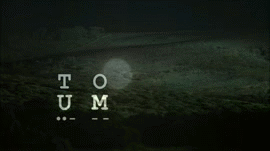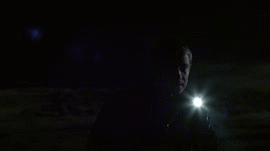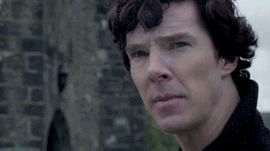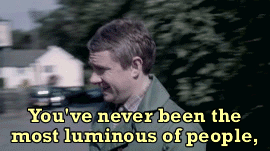
BBC Sherlock Fan Forum - Serving Sherlockians since February 2012.
- besleybean
- Threatened Knighthood
 Offline
Offline 
- From: Carnoustie, Angus, Scotland.
- Registered: October 4, 2012
- Posts: 21,380
Re: Johnlock: The Official Debate
That account sounds rather like how I see John and Mary.
---------------------------------------------------------------------------------------------------------------------------------------------------------------
- Liberty
- Moderator
 Offline
Offline 
- Registered: June 29, 2014
- Posts: 5,992
Re: Johnlock: The Official Debate
I was listening to Steven Moffat talking about Sherlock and I love this quote - probably better on the friendship thread, but I thought it went well here in answer to the question about what's unique about their friendship:
We're always going to be in love with .... the sheer warmth and gravity and strength of that friendship. That instant, unmoveable, unchanging friendship between these two men whom nobody else would ever say should even meet. They are just, from the moment they meet until decades later, absolutely steadfast friends. Whatever their failings individually, together they make such a lovely unit.
(It also kind of confirms that it's a friendship, too!).
- SusiGo
- The game is never over (moderator)
 Offline
Offline 
- From: Germany
- Registered: June 5, 2012
- Posts: 22,969
Re: Johnlock: The Official Debate
What has always bothered me in this discussion is the attempt to separate love and friendship. They do not exclude each other.
As for the quote - I take it that Steven is talking about Canon, not about his show, since he is talking mentioning decades.
------------------------------
"To fake the death of one sibling may be regarded as a misfortune; to fake the death of both looks like carelessness." Oscar Wilde about Mycroft Holmes
"It is what it is says love." (Erich Fried)
“Enjoy the journey of life and not just the endgame. I’m also a great believer in treating others as you would like to be treated.” (Benedict Cumberbatch)

- besleybean
- Threatened Knighthood
 Offline
Offline 
- From: Carnoustie, Angus, Scotland.
- Registered: October 4, 2012
- Posts: 21,380
Re: Johnlock: The Official Debate
I don't think anybody has ever tried to separate love and friendship.
Quite the opposite.
I have always stressed that Sherlock and John love each other.
What I separate is loving someone and being in love with a person.
I even give examples; a parent may love their child, but they are in-love with their partner.
---------------------------------------------------------------------------------------------------------------------------------------------------------------
- Liberty
- Moderator
 Offline
Offline 
- Registered: June 29, 2014
- Posts: 5,992
Re: Johnlock: The Official Debate
Susi, he was talking about both (about why the Sherlock Holmes universe is so popular). He seems to think that we are attracted to that friendship. (And I agree!)
And yes, of course they love each other. I don't think anybody denies that. As I kept trying to explain, that's the difficulty of "proving" the friendship - they could still be friends even if they were lovers. On the other hand, if somebody calls the relationship a "friendship", it does usually kind of exclude being lovers.
- besleybean
- Threatened Knighthood
 Offline
Offline 
- From: Carnoustie, Angus, Scotland.
- Registered: October 4, 2012
- Posts: 21,380
Re: Johnlock: The Official Debate
John himself exemplifies it: he makes Mary his wife, she is the best thing that has happened to him and he says her future with him will be his privilege. She is his sexual partner of choice,
Sherlock he calls 'mate', his best friend.
---------------------------------------------------------------------------------------------------------------------------------------------------------------
- Zatoichi
- Official Blogger
 Offline
Offline 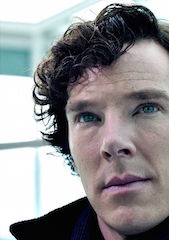
- Registered: January 28, 2014
- Posts: 1,355
Re: Johnlock: The Official Debate
Ho Yay wrote:
If one sees it -> One's mindset free from heteronormativity enough to see it.
If one doesn't see it -> heteronormativity is blocking from seing it or one has consumed very little romance in media to be acquainted with a language that is taught to viewers since childhood
..Sherlock has a progression that heteronormativity blocks from seeing...
What about if one sees it but doesn't believe it will be followed through because there are also many tropes that contradict a romantic arc? Like almost being blown up together and none of them confessing? Or like one of them going into certain death and the other one instead of rebelling or breaking down or yelling "this is just wrong!!" just watches while holding his wife's hand? Or one of them chosing his wife over and over, no matter what she did to his true love interest? It is things like that that make me not root for their romance, is this what you mean by "a progession that heteronormativity blocks fom seeing"?
Could it maybe also be thinkable that if one has grown up with massive exposure to romance they might find it hard to imagine a show might just be flirting with the idea of romance, or mingle it with deep care and friendship without the typical progression of love-stories? Being so used to a (stereo)typical progression of romance might not always be an advantage when interpreting shows like Sherlock, which are so inventive and not bound to any known genre (*cough* and not overly attached to the idea of internal consistency *cough*)..?
When John saves Sherlock in TAB again there are stares, flirting and Moriarty even remarks on it, they keep flirting and throw him off a cliff. They get established as a couple.
Could you explain a little more why you think this establishes them as a couple? because I also read the contrary interpretation that they finally got rid of the mistaken gay assumptions impersonated by crazy Moriarty there.. And as I get it they return to modern times afterwards and everything is just as it always has been, with Mary and everything (apparently Ben has declared in an interview that "she is the glue keeping the two if them together".. Blegh. But this probably belongs in the Mary-thread..).
- Liberty
- Moderator
 Offline
Offline 
- Registered: June 29, 2014
- Posts: 5,992
Re: Johnlock: The Official Debate
Oh dear, I'm not a fan of that Mary comment ![]() . But as ever, interesting to get one of the team's take on it.
. But as ever, interesting to get one of the team's take on it.
That's a good point about us being conditioned to see conventional romance - that is so true! With these two characters put in a situation that has a lot of parallels with a romantic one (thrust together by fate, finding a connection that they have with nobody else, loving each other, saving each other, etc.) it's maybe natural that people should extrapolate that this IS a romance. Their sex doesn't come into it, except in that it provides a reason (homophobia) for them not to have got together by now which would be difficult to find with a straight couple. (I wonder if this is one of the reasons the writers have chosen to show the lack of homophobia - to be clear that this isn't their intention, in contrast to TPLOSH).
Anyway, I thought I'd just mention TSOT as something that shows they are friends rather than (would-be) lovers, difficult as it is to prove the absence of sexual attraction! Mrs Hudson talks to Sherlock about her relationship with her friend changing after the wedding. This seems to be what Sherlock is worried about, rather than being jealous of Mary. We do see Sherlock being jealous of Sholto later, John's friend. (I know some people have added backstory making Mrs Hudson's friend her lover, and making Sholto John's ex-lover, but there's no indication of that in the show itself). It's not the same when friends marry, it's not the same when friends have babies, not if you're not doing it alongside them.
At the end of TSOT Sherlock has realised the difference the baby is likely to make. He hopes to dance with Janine, but she has paired up, and others seem to be in (imperfect!) pairs. Sherlock realises he has chosen to not be part of that world, and leaves alone. For me, this links to to the conversation in TAB as well, about why he chooses to be alone.
- Ho Yay
- Cipher Expert
 Offline
Offline 
- Registered: September 12, 2015
- Posts: 126
Re: Johnlock: The Official Debate
Zatoichi wrote:
Ho Yay wrote:
If one sees it -> One's mindset free from heteronormativity enough to see it.
If one doesn't see it -> heteronormativity is blocking from seing it or one has consumed very little romance in media to be acquainted with a language that is taught to viewers since childhood
..Sherlock has a progression that heteronormativity blocks from seeing...What about if one sees it but doesn't believe it will be followed through because there are also many tropes that contradict a romantic arc? Like almost being blown up together and none of them confessing? Or like one of them going into certain death and the other one instead of rebelling or breaking down or yelling "this is just wrong!!" just watches while holding his wife's hand? Or one of them chosing his wife over and over, no matter what she did to his true love interest? It is things like that that make me not root for their romance, is this what you mean by "a progession that heteronormativity blocks fom seeing"?
Could it maybe also be thinkable that if one has grown up with massive exposure to romance they might find it hard to imagine a show might just be flirting with the idea of romance, or mingle it with deep care and friendship without the typical progression of love-stories? Being so used to a (stereo)typical progression of romance might not always be an advantage when interpreting shows like Sherlock, which are so inventive and not bound to any known genre (*cough* and not overly attached to the idea of internal consistency *cough*)..?When John saves Sherlock in TAB again there are stares, flirting and Moriarty even remarks on it, they keep flirting and throw him off a cliff. They get established as a couple.
Could you explain a little more why you think this establishes them as a couple? because I also read the contrary interpretation that they finally got rid of the mistaken gay assumptions impersonated by crazy Moriarty there.. And as I get it they return to modern times afterwards and everything is just as it always has been, with Mary and everything (apparently Ben has declared in an interview that "she is the glue keeping the two if them together".. Blegh. But this probably belongs in the Mary-thread..).
There are no tropes that contradict a romantic arc, there's just some obstacles that along with a massive romantic coding make it a romance with obstacles.
We can only speculate on what was going on in their mind in series 3, but they had actual reasons not to confess at the bomb, they relationship was strained by a two year separation. John had felt betrayed and moved on, found somebody else. In Sherlock's progression: Sherlock has the obstacles of repressing his feelings, John has the obstacles of thinking someone such as Sherlock will not be interested in a romantic relationship, especially with him as Sherlock said so as soon as they met and John enquired, John is not out, John is engaged. Which brings to a common factor of tension in romance -> Both don't know the other is interested so they cannot confess.
You cannot "just confess" you love. The viewers know the other character is in love as well, no the character themselves.
And as I already said at lenght in the pages just before 1) there are story writing problem with keeping the tension as high when the leads get together without using struggle tropes that make shippers actually uncomfortable, so writers often wait till the end of the work of fiction 2) expecting something as big as a confession or a kiss to recognise a romantic arc and seeing the negation of it by their absence are a result of heteronormativity, that perceives non hetero couples to have different rules and not sufficing the coding that is usually given before the couple actually gets together having took the time to finish its progression.
The scene at the tarmac is actually two romantic tropes:
- Aborted Declaration of Love: Sherlock wanted to confess something to John before going inside the plane, but made a joke instead. He had already confessed his feelings of friendship at the wedding.
- I Want My Beloved to Be Happy: Sherlock sacrifices himself so that John can have a family with Mary and their baby.
We cannot exactly know what was in John's mind, whether he thought Sherlock had a plan, whether John had a plan, if he still thinks Sherlock is not interested in romance. Sherlock maybe thought John actually loved Mary more than him, maybe he thought she was working for Mycroft and she was good, it's all speculation.
Romantic coding, especially specific tropes cannot be perceived wrongly because of an over exposure. They don't exist in real life and can only be put there intentionally, wanting the viewer to perceive them.
They are a language that communicates a thing. And we know that Moffat and Gatiss are acquainted with that language (and even reference it's existance at times).
Flirting with the idea of romance without delivering must be attached to other kind of coding that aligns the viewer to the fact that those characters are not a couple destined to be together, which is the exact contrary of what is happening in Sherlock, when they are massively romantically coded and coded as a the couple of the couples. Otherwise it the story is not written properly and the viewers are not satisfied.
If they don't want to communicate a romance, they just can avoid using massive romantic coding. Nobody needs it to represent any kind of friendship because much of it doesn't even exist in real life.
There is nothing inventive in perpetuating the idea and the discrimination that between men romantic coding results in friendship/the strongest friendship.
Moffat and Gatiss have often said that they lie a lot in interview to surprise you, so I would not take in consideration anything that is said in any interview.
I think that people flirting + "there is always two of us" is self-explaining that they are a couple.
The sign of three free of sexual attraction? The episode in which there is a whole scene in which John gets them drunk and puts feet near Sherlock's ass and touches his knee? And Sherlock has then his arm behind John's back? And there are two visual innuendo of Sherlock giving fellatio? And we discover that they danced together? And as soon as John knows Mary is pregnant puts a hand on Sherlock's neck?
There is no indication that Sholto and John were not interested in each other. One is actually presumed to count in the fact that we know John is bi (and military is not very friendly about it) at this point because of all the previous coding. In this case also we cannot know exactly what is going on and can only speculate, but if you're gay and you think the one you love is not into men, you may befriend a woman to see him happy (especially if you feel guilty about abandoning him), but be especially jealous if it turns actually out that there is a man in John's past.
Last edited by Ho Yay (January 30, 2016 1:03 pm)
- besleybean
- Threatened Knighthood
 Offline
Offline 
- From: Carnoustie, Angus, Scotland.
- Registered: October 4, 2012
- Posts: 21,380
Re: Johnlock: The Official Debate
Excuse me, I don't know John is bi at all.
There is no indication of this.
There is nothing to indicate anything other than he and Sholto were officer comrades, through which they became close friends.In fact this is emphasised by Mary: ' neither of us were the first'.
She knows she is no the first woman John has slept with and she's gently telling Sherlock that John did once have another good friend in Sholto.
It's the friendship Sherlock is jealous of.
Mary is not a rival to him in that way, because they perform different functions.
There is nothing to indicate he wants to perform the function that Mary does.
Last edited by besleybean (January 30, 2016 1:00 pm)
---------------------------------------------------------------------------------------------------------------------------------------------------------------
- Ho Yay
- Cipher Expert
 Offline
Offline 
- Registered: September 12, 2015
- Posts: 126
Re: Johnlock: The Official Debate
besleybean wrote:
Excuse me, I don't know John is bi at all.
.
It seems you have not followed anything I said about not presuming people are not bi.
Even if there was no indication, John could be bi, because bi people looks just like everybody else and queerness doesn't show until you actually do something with someone not from the opposite gender.
But in BBC Sherlock's case John has romantic coding towards a man in the first episode and casual flirting towards a woman. That should be enough.
- Vhanja
- One More Miracle
 Offline
Offline 
- From: Sandnes, Norway
- Registered: December 11, 2014
- Posts: 6,607
Re: Johnlock: The Official Debate
Ho Yay wrote:
The scene at the tarmac is actually two romantic tropes:
- Aborted Declaration of Love: Sherlock wanted to confess something to John before going inside the plane, but made a joke instead. He had already confessed his feelings of friendship at the wedding.
- I Want My Beloved to Be Happy: Sherlock sacrifices himself so that John can have a family with Mary and their baby.
The problem with assigning these, and other romantic tropes, to the show is that they only work as romantic tropes if the viewers are told without any doubt that the characters in question have romantic feelings for each other. If they don't have romantic feelings for each other, then by definition the tropes can't be assigned to those scenes.
If we knew that Sherlock had planned on telling John that he loved him, and then bailed out, the first trope would be true. But we don't know that.
Because all we have to go with is the assumption that they feel romantically for each other because there are romatnic tropes. But for the romantic tropes to be actually be in the show, the viewers need to first be told cleary and without doubt that they have these feelings for each other. So it becomes circular argumetantion.
An example: Ross and Rachel. We know very early on that they have feelings for each other - because they both say so clearly and without any doubt. And after that, there are tons of romantic tropes with obstacles, jealosy, misunderstandings, "will they or won't they" etc etc.
I don't buy the "Hetereonormative view" as the sole explanation for why a lot of people don't see it in Sherlock. Look at Brokeback Mountain - no one doubted the mutual attraction there, even before the sex scene. Moftiss are good writers, if they wanted to make this into a gay romance beyond any doubt, they could have done so. And, yes, you can have sexual and romantic tension even if you make it clear early on that they do have feelings for each other (ie Ross/Rachel and Brokeback Mountain).
__________________________________________________________________________________________________________________________________________
"We'll live on starlight and crime scenes" - wordstrings

Team Hudders!
- Ho Yay
- Cipher Expert
 Offline
Offline 
- Registered: September 12, 2015
- Posts: 126
Re: Johnlock: The Official Debate
Vhanja wrote:
Ho Yay wrote:
The scene at the tarmac is actually two romantic tropes:
- Aborted Declaration of Love: Sherlock wanted to confess something to John before going inside the plane, but made a joke instead. He had already confessed his feelings of friendship at the wedding.
- I Want My Beloved to Be Happy: Sherlock sacrifices himself so that John can have a family with Mary and their baby.
The problem with assigning these, and other romantic tropes, to the show is that they only work as romantic tropes if the viewers are told without any doubt that the characters in question have romantic feelings for each other. If they don't have romantic feelings for each other, then by definition the tropes can't be assigned to those scenes.
If we knew that Sherlock had planned on telling John that he loved him, and then bailed out, the first trope would be true. But we don't know that.
Because all we have to go with is the assumption that they feel romantically for each other because there are romatnic tropes. But for the romantic tropes to be actually be in the show, the viewers need to first be told cleary and without doubt that they have these feelings for each other. So it becomes circular argumetantion.
An example: Ross and Rachel. We know very early on that they have feelings for each other - because they both say so clearly and without any doubt. And after that, there are tons of romantic tropes with obstacles, jealosy, misunderstandings, "will they or won't they" etc etc.
I don't buy the "Hetereonormative view" as the sole explanation for why a lot of people don't see it in Sherlock. Look at Brokeback Mountain - no one doubted the mutual attraction there, even before the sex scene. Moftiss are good writers, if they wanted to make this into a gay romance beyond any doubt, they could have done so. And, yes, you can have sexual and romantic tension even if you make it clear early on that they do have feelings for each other (ie Ross/Rachel and Brokeback Mountain).
I'm replying to the same thing all over again, i'll just quickly repeat what I have explained in detail before:
1) Romantic coding is the language you get clearly told and it's the language almost everybody know since childhood. Hetoronormativity blocks it.
2) The point of a will they won't they is that the viewers are in doubt to keep the tension high! But the story will resolve in a romance and make them satisfied.
3) one does not expect anything more material to happen before the characters actually get together to confirm a romance. It could happen, but it's far from a necessity. Hetero couple are not so doubted, so this too is probably the result of heteronormativity.
4) Different stories are have different progressions and there are various degrees of heteronormativity. People realizing people are gay in one story doesn't mean they are not heteronormative, if they pick up romantic coding only in certain circumstances and not in others where it would be obvious for hetero couples. People not seen romantic coding in Sherlock is a proved thing. It is the mindset that has to bend, not Moftiss that have to put neon lights with "Sherlock and John" are in love.
- Vhanja
- One More Miracle
 Offline
Offline 
- From: Sandnes, Norway
- Registered: December 11, 2014
- Posts: 6,607
Re: Johnlock: The Official Debate
Yes, you are only repeating yourself instead of replying to the new arguments given:
To assign these romantic tropes to the scenes is an assumption, because we don't yet know if there are romantical feelings involved. It's not that the tropes are proof of romance - it's that they tropes are in the scenes if - and only if - there are romantical feelings involved. And we don't know that yet.
So we don't know enough yet to know if these romantic tropes can be assigned or not, because we don't have all the information yet. Only when the show is completed and we know how it ends can we see if these romantic tropes were there or not.
As it is now, they are based on assumptions:
- We assume that what Sherlock was going to say on the tarmac was a declaration or romantic love
- We assume that John is bi
- We assume he had a romantic/sexual relationship with Sholto
- We assume Sherlock's jealosy towards Sholto is romantic/sexual
- We assume John was flirting in the Angelo's scene
etc etc etc.
Now, these assumptions can be right, of course. But they can also be wrong. Therefore, we don't know if a lot of these romantic tropes are relevant or not. Not until we learn if there indeed are any romantic emotions between Sherlock and John. If there are, all these romanic tropes are probably true. If there aren't, the romantic tropes aren't relevant because that is not what the scenes were about. (For instance: "Aborted Declaration of Love" is only relevant IF that is what Sherlock was going to do. Which we don't know).
__________________________________________________________________________________________________________________________________________
"We'll live on starlight and crime scenes" - wordstrings

Team Hudders!
- Mothonthemantel
- British Government
 Offline
Offline 
- From: Wales.
- Registered: January 4, 2016
- Posts: 609
Re: Johnlock: The Official Debate
You think think the romantic tropes and sexual imagery are being misinterpreted because of wishful thinking ?
"Man may not be degraded to being a machine by being denied to be a ghost in the machine."
It's just transport. The virus in the hard drive . However impossible .Must be the truth.
- besleybean
- Threatened Knighthood
 Offline
Offline 
- From: Carnoustie, Angus, Scotland.
- Registered: October 4, 2012
- Posts: 21,380
Re: Johnlock: The Official Debate
I do.
---------------------------------------------------------------------------------------------------------------------------------------------------------------
- Vhanja
- One More Miracle
 Offline
Offline 
- From: Sandnes, Norway
- Registered: December 11, 2014
- Posts: 6,607
Re: Johnlock: The Official Debate
Mothonthemantel wrote:
You think think the romantic tropes and sexual imagery are being misinterpreted because of wishful thinking ?
I think we make assumptions based on the filter we view the show through, whether we ship Johnlock or don't ship them at all.
I wouldn't call it misintepretation, because we don't yet know how the show will end. If Sherlock and John end up as a couple, or we are told explicity that they do have romantic feelings toward each other, then the Johnlockers were the one interpreting the show correctly. Also, we can't rule out that Moftiss have quite consciously added ambiguity.
But if they have, that is what it is - ambiguity. Meaning that both interpretation (Johnlock or platonic friendship) are still viable. If they weren't, it wouldn't be ambigious at all and no one would be in any doubt either way. I don't think there are many people who doubt that Ross and Rachel had romantic feelings for each other.
Last edited by Vhanja (January 30, 2016 3:08 pm)
__________________________________________________________________________________________________________________________________________
"We'll live on starlight and crime scenes" - wordstrings

Team Hudders!
- Mothonthemantel
- British Government
 Offline
Offline 
- From: Wales.
- Registered: January 4, 2016
- Posts: 609
Re: Johnlock: The Official Debate
Yes. People see what they want to see . That is also true for the people that want to see friendship only .
"Man may not be degraded to being a machine by being denied to be a ghost in the machine."
It's just transport. The virus in the hard drive . However impossible .Must be the truth.
- Vhanja
- One More Miracle
 Offline
Offline 
- From: Sandnes, Norway
- Registered: December 11, 2014
- Posts: 6,607
Re: Johnlock: The Official Debate
Mothonthemantel wrote:
Yes. People see what they want to see . That is also true for the people that want to see friendship only .
Absolutely. It goes for us all.
__________________________________________________________________________________________________________________________________________
"We'll live on starlight and crime scenes" - wordstrings

Team Hudders!
- besleybean
- Threatened Knighthood
 Offline
Offline 
- From: Carnoustie, Angus, Scotland.
- Registered: October 4, 2012
- Posts: 21,380
Re: Johnlock: The Official Debate
I don't fit into that category.
I would have loved if Mark and Steven had gone for a full gay romp, but they didn't.
We have seen: John marry a woman, date women, show attraction to women and respond to a woman in a hot blooded way. Oh and we know he has naked women on his lap top.
We have seen no evidence of him ever being interested in men, let alone date them.
Last edited by besleybean (January 30, 2016 3:13 pm)
---------------------------------------------------------------------------------------------------------------------------------------------------------------


